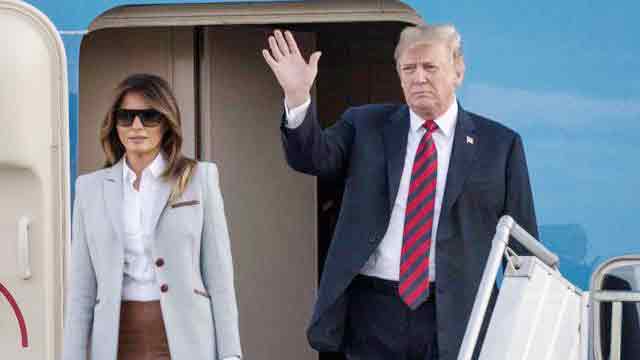Washington, July 16 (Just News): Donald Trump has said ties with Russia have “NEVER been worse” and blamed US politicians, ahead of his first-ever summit with counterpart Vladimir Putin.
In a tweet the US president denounced his predecessor’s “stupidity” and the “rigged” inquiry into alleged Russian interference in the 2016 election.
The summit is being held in the Finnish capital, Helsinki, later on Monday.
Some US politicians had called for it to be cancelled after 12 Russians were changed with hacking on Friday.
The defendants - all Russian intelligence officers - are accused of launching cyber-attacks on the 2016 presidential campaign of Democratic candidate Hillary Clinton.
Mr Trump has said he will raise the issue in the Helsinki meeting, in which the two leaders will be joined only by their interpreters.
The summit comes after a tumultuous European tour in which Mr Trump criticised allies of the US over trade and military spending.
In his tweet, Mr Trump put the blame for the deterioration of relations with Russia squarely on US domestic forces.
BBC diplomatic correspondent James Robbins says the tweet is likely to alarm White House advisers, already nervous about the risks of giving too much ground to the Russian leader during the talks.
What are the main sources of tension with Russia?
Many in the West have criticised Moscow for what they regard as its destabilising activities in Ukraine. The US, among others, has imposed sanctions on Russia over its annexation of Crimea in 2014.
Tensions are also high as a result of accusations of Russian interference in the 2016 election in the US. The allegations are being investigated by Special Counsel Robert Mueller.
Mr Trump has consistently denounced the inquiry as a "witch hunt".
The 12 Russians were indicted on Friday as part of Mr Mueller's investigation.
They are accused of using keystroke-reading software to spy on the chair of the Democratic National Committee (DNC) and hack into the party's computers.
Top Democrats including party chairman Tom Perez have urged Mr Trump to cancel the talks, saying Mr Putin was "not a friend of the United States".
On the Republican side, Senator John McCain said the summit "should not move forward" unless the president "is prepared to hold Putin accountable".
Russia denies the hacking allegations, and says it is looking forward to the talks as a vehicle for improving relations.
What will be discussed at the summit?
US National Security Adviser John Bolton has said that both sides have agreed the meeting will have no set agenda.
But he said he found it "hard to believe" Mr Putin did not know about the alleged election hacking and the subject would be mentioned.
"That's what one of the purposes of this meeting is, so the president can see eye to eye with President Putin and ask him about it," he told ABC News.
Mr Trump has also been urged to raise the poisoning of two people in the UK who came into contact with the nerve agent Novichok on 30 June. Investigators believe the incident is linked to the poisoning of a former Russian spy and his daughter in March.
Mr Trump elaborated on what would be discussed at the summit during a joint press conference with UK Prime Minister Theresa May last week.
"We'll be talking about Syria," he said. "We'll be talking about other parts of the Middle East. I will be talking about nuclear proliferation."
An uncertain spectacle
Both leaders will feel they have won simply by meeting with the eyes of the world upon them.
President Putin, still basking in the glory of hosting the World Cup, will project Russian power as he stands shoulder to shoulder with his American counterpart. There is a lot in this for him.
President Trump will again savour the spotlight as the world's self-proclaimed dealmaker. He attacks allies and admires strongmen like the Russian leader.
His penchant for disruptive diplomacy means he could announce unexpected concessions and startle allies and advisers alike.
There could also be some rewards. A dialogue is crucial. Significant issues ranging from a nuclear arms race to wars in Syria and Ukraine deserve their attention.
But with no agenda, little preparation, and a lot of Trumpian unpredictability, no-one can be certain what will actually happen.
What has Mr Trump been doing so far in Europe?
His tour has included a Nato summit in Belgium and a visit to the UK. Neither passed without controversy.
Following the Nato summit, Mr Trump said the allies had pledged to "substantially" raise their defence budgets but other leaders cast doubt on this claim.
The UK visit also had its ups and downs after Mr Trump told a newspaper the US would probably not give the UK a trade deal under the terms of Mrs May's Brexit plans - and then later appeared to backtrack on this position.
He also said Europe was "losing its character" because of immigration from Africa and the Middle East.
On Sunday, just before he departed for Helsinki, Mr Trump described the European Union as a foe on trade.
He told CBS News that European countries were taking advantage of the US and not paying their Nato bills.-BBC
(Justnews/ys/1420hr)





